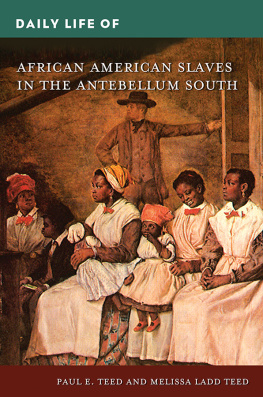Copyright 1982 by The University Press of Kentucky
Scholarly publisher for the Commonwealth,
serving Berea College, Centre College of Kentucky,
Eastern Kentucky University, The Filson Club,
Georgetown College, Kentucky Historical Society,
Kentucky State University, Morehead State University,
Murray State University, Northern Kentucky University,
Transylvania University, University of Kentucky,
University of Louisville, and Western Kentucky University.
Editorial and Sales Offices: Lexington, Kentucky 40506-0024
Library of Congress Cataloging in Publication Data
Bergeron, Paul H., 1938
Antebellum politics in Tennessee.
Bibliography: p.
Includes index.
1. TennesseePolitics and governmentTo 1865.
I. Title.
F436.B46 1982 976.804 82-40170
ISBN 978-0-8131-5123-6
To my wife,
Mary Lee
Preface
There seems to be little ground for disputing the point that the Volunteer State was in its political zenith in the antebellum period. This study of politics in Tennessee begins with the 1830s when Andrew Jackson was president and concludes on the eve of John Bells abortive quest for that office in 1860. In the interval, Hugh Lawson White unsuccessfully sought the presidency in 1836 and James K. Polk won it eight years later. And Andrew Johnson, an eminent figure in state politics even before the Civil War, was to become president in 1865 upon the death of Abraham Lincoln. Judged simply in terms of political luminaries on the national scene, Tennessee enjoyed an enviable position in the prewar decades, and national observers regularly deemed the state a crucial one, in terms of leaders and votes.
Monographic literature appearing during the past fifteen years has also served as both a stimulus and a guide to my own examination of antebellum politics. Richard P. McCormicks pathbreaking study, The Second American Party System: Party Formation in the Jacksonian Era, has been particularly influential. I have therefore directed a good bit of attention toward party organization and the mechanics of conducting canvasses in Tennessee, with an emphasis on the presidential contests. I have presented the view that in the campaigns the parties were essentially electoral machines, not given to notable ideological differences.
As a natural by-product of my concern with party structure, I have investigated and discussed intraparty frictions. No sooner were the parties actually established in Tennessee than feuding broke out within themsometimes serious, sometimes simply annoying. Students of the states political history have had little or nothing to say about disharmony and rivalry within the political organizations, but this dimension of the story needs explication, for it indicates among other things how difficult it often was for the parties to put forth a united effort during a given campaign.
Another topic demanding attention is the constancy and fidelity of the voters. Repeatedly the electorate behaved in ways almost rigidly consistent with previous actions. In fact, once the two parties were securely organized the variations were so slight as to be noteworthy. The disruptions of the 1850s brought about some alterations of voting patterns, but nothing like what one might have expected. In nearly all statewide contests, the percentage and aggregate vote differentials between the winners and losers were incredibly narrow, so the claim that the two parties were evenly balanced and fiercely competitive seems completely justified.
One of the visible threads that ties together the chronicle of politics in the Volunteer State is intrastate sectionalism. Originally prescribed by nature, Tennessees tripartite division invariably had an impact upon the socioeconomic and political ways of the people. On the eve of the development of the two-party system in the state, it was clear that sectional loyalties frequently prevailed over commitment to Tennessees general welfare and needs. From the mid-1830s until the Civil War intrastate sectionalism influenced and shaped two-party politics, for almost from the beginning the eastern and western thirds of the state joined hands in the political arena in an attempt to offset Middle Tennessees dominance and power. It is not surprising to find the two ends of the state embracing, leading, and sustaining the revolt against Jackson and his party. In the mid-1850s the sectional alignments underwent transformation, however, as West Tennessee abandoned its traditional loyalties and became Democratic.
I have restricted myself to an investigation and discussion of statewide contests, that is, gubernatorial and presidential races. But since the election of United States senators by the legislature often took on the coloration and significance of statewide competition, I have also studied the battles for Senate seats. Gubernatorial, presidential, and senatorial contests are examined within a basic chronological framework, although there are topical arrangements within each chapter. Since I believe that each of the three decades under study exhibited certain features around a general theme, I have devoted a separate chapter to each of them, with the chapter titles announcing the thesis or theme. The first major chapter, , examines all the statewide elections together in terms of electoral behavior across twenty-five years. A longitudinal overview, mainly in empirical terms, is the focus of this chapter. In the concluding chapter, the social composition of the parties is dealt with in order to say something about the voters and leaders who have been discussed in the earlier chapters. Finally, it should be noted that instead of focusing upon either the Jacksonian or the anti-Jacksonian party, as has been done in several studies of other southern states, I have chosen to scrutinize both parties as they fought against each other for the prizes of political office.
Except for passing references to congressional and legislative races, I have left those contests unexplored, nor have I dealt with city and county elections in the antebellum period. I would argue not that such races lacked importance but that the quantity and nature of them placed them beyond my scope. Another worthy area of investigation not touched upon in this study is the behavior of the two parties in the General Assembly toward various pieces of legislation.
Anyone familiar with McCormicks Second American Party System, with William J. Cooper, Jr.s The South and the Politics of Slavery, 1828-1856, and with studies of other states knows that many of Tennessees political experiences were not unique but instead conformed to developments in the South and elsewhere. Yet from time to time and in certain ways the state did seem to exhibit unusual political behavior. Moreover, the establishment of a clearly defined and vigorously active two-party system was unique in the annals of Tennessee politics and thereby brought a new day in partisan competition. This study is therefore directed toward showing this new style and manner of conducting politics, unraveling its complexities, and discovering and identifying themes in that story.
It is a distinct pleasure to acknowledge my indebtedness to institutions and persons. I have depended on a number of libraries and archives, but the two that have been the most important are the Tennessee State Library and Archives in Nashville and the Special Collections Department of the University of Tennessee Library. The latter, headed by John Dobson, has not only helped me with various materials but has also provided me with a convenient and hospitable place in which to work. University of Tennessee summer research grants have expedited progress on this project.










